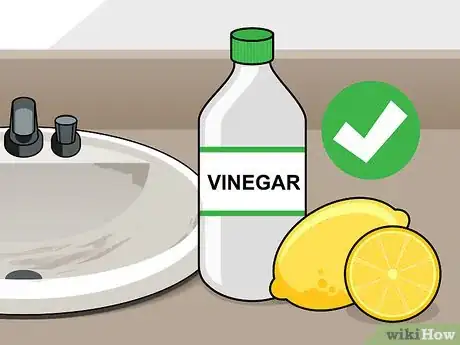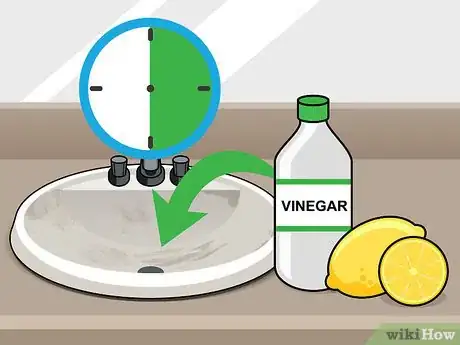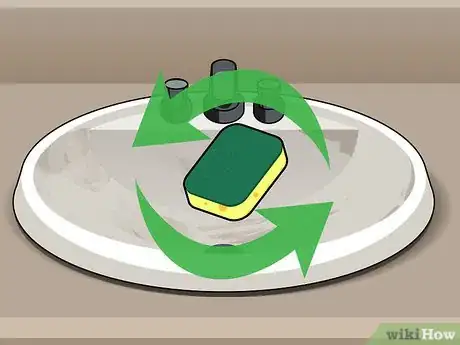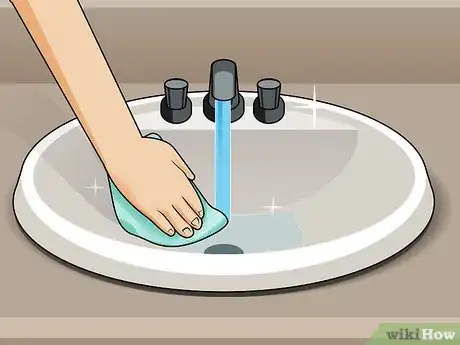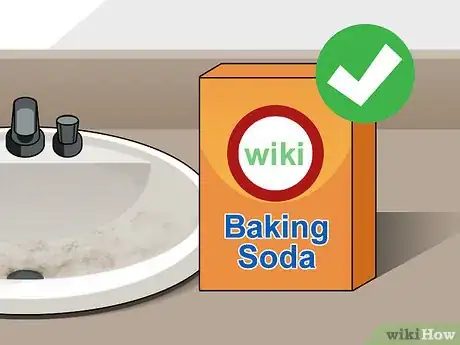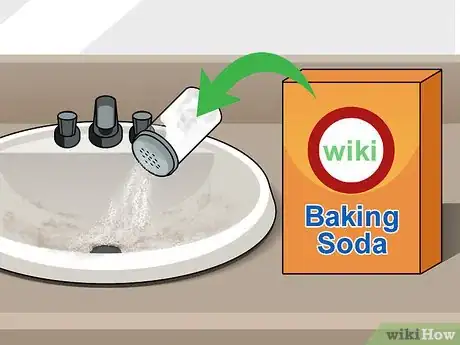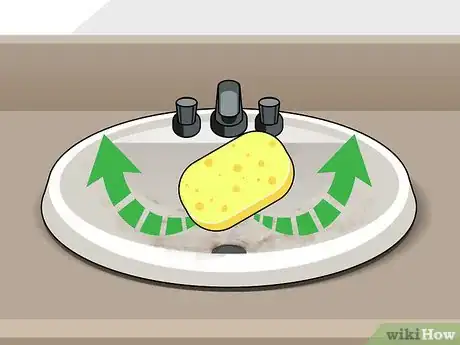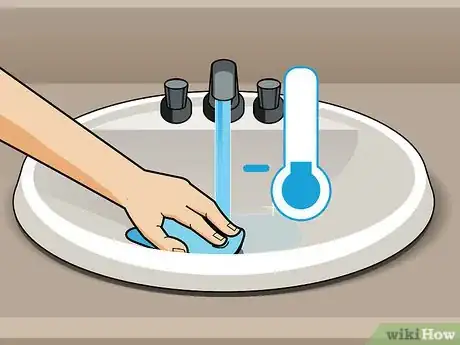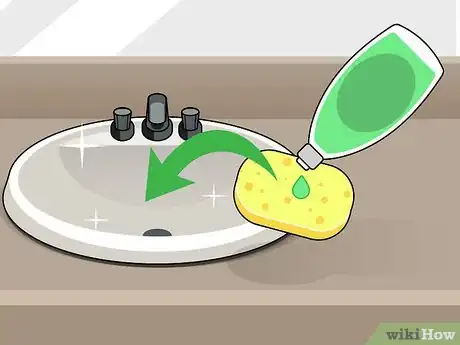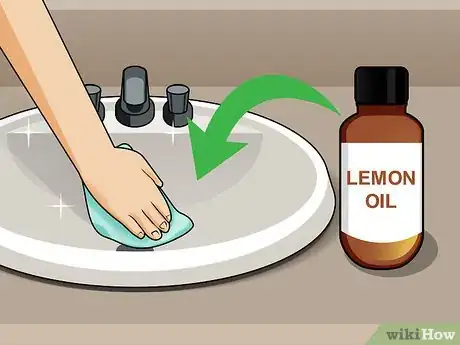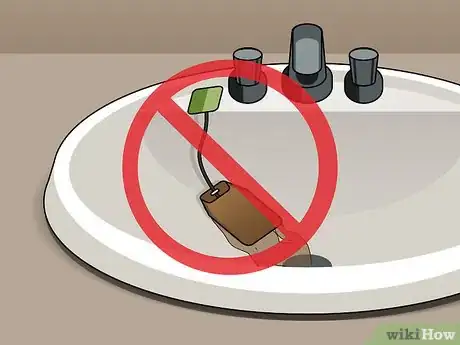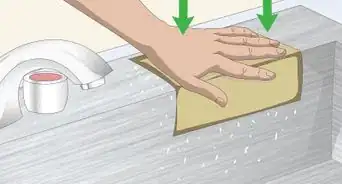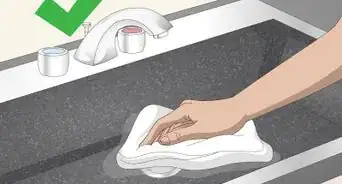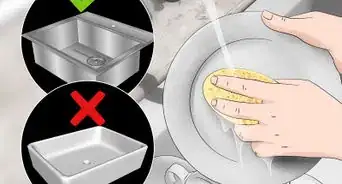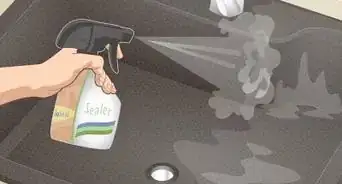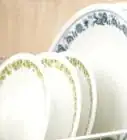This article was co-authored by Susan Stocker and by wikiHow staff writer, Megaera Lorenz, PhD. Susan Stocker runs and owns Susan’s Green Cleaning, the #1 Green Cleaning Company in Seattle. She is well known in the region for outstanding customer service protocols — winning the 2017 Better Business Torch Award for Ethics & Integrity —and her energetic support of green cleaning practices.
This article has been viewed 147,304 times.
Ceramic sinks are delicate, and can easily become scratched or stained if not cared for properly. You can save money – and your sink – by using gentle cleansers made from household ingredients. Remove stains using a mild acid like lemon juice or vinegar. For extremely stubborn buildup, use baking soda as an abrasive cleanser. Keep your sink clean by regularly washing it with a sponge and a gentle detergent.
Steps
Removing Stains with Lemon Juice or Vinegar
-
1Apply lemon juice or vinegar to any stained areas. These mild acids are especially effective at removing rust stains. If you use lemon, you can either squeeze the juice onto the stain or gently rub the stain with a lemon wedge. Alternatively, pour a little white vinegar on the stain.[1]
-
2Allow the cleanser to sit for a while. While lemon juice and vinegar are both fairly gentle, they should not be left sitting on your ceramic for too long. Allow the stained area to soak only as long as necessary, or you might risk etching the surface or your sink, which will make it harder to clean in the future.[2]
- Try wiping the stained area with a gentle sponge or cloth after half an hour or so to see if the stain is ready to come off.
Advertisement -
3Wipe down the stained surface. Don’t use anything too abrasive. The soft side of a kitchen sponge or a washrag should work for this purpose.[3]
- While it may be tempting to reach for a Magic Eraser, melamine sponges actually work like a very fine-grained sandpaper, and can scratch up your sink.
-
4Rinse thoroughly. After using any kind of acidic cleanser on your sink, you should carefully rinse it away with water. Make sure there isn’t any residual lemon juice or vinegar sitting in your sink, gradually eating away at the ceramic.[4]
Removing Stubborn Buildup with Baking Soda
-
1Use baking soda as a last resort. Although it is very mild compared to other abrasive cleansers, baking soda (sodium bicarbonate) can still scratch up your sink. Use it only if you can’t take off the dirt with soap and water or lemon juice.[5]
-
2
-
3Carefully scrub with a sponge. Use a slightly damp (not soaking wet) scrubber to gently rub away the dirt. The baking soda should form small clumps that take the dirt with them as they come up.[8]
- Use a non-scratch scrubbing sponge.
- Avoid steel wool or pumice stones for this purpose, as both can do a lot of damage to ceramic or porcelain sinks.
-
4Rinse away the baking soda. Run some cold water into the sink and rinse away any remaining dirt and baking soda. Wipe down with a clean, dry towel or rag.
Maintaining Your Sink
-
1Regularly wash your sink with soap and water. You can prevent dirt and stains from building up in the first place by gently washing your sink after every use. Use a little dish soap and a soft, non-abrasive sponge, and rinse thoroughly with clean water.[9]
-
2Wipe down your sink with lemon oil. Lemon oil will help keep your sink smelling fresh, and give it a beautiful sheen. The oil also protects your sink from stains and dirty buildup. Apply a little lemon oil after your regular cleaning.[10]
-
3Avoid leaving anything staining in your sink overnight. Coffee grounds, tea bags, wine, and other dark or staining substances can leave permanent or hard-to-remove marks on your sink. Prevent stains by quickly removing anything that could mark your sink, and rinsing thoroughly after exposure.[11]
Expert Q&A
-
QuestionHow do you get stains out of a ceramic sink?
 Susan StockerSusan Stocker runs and owns Susan’s Green Cleaning, the #1 Green Cleaning Company in Seattle. She is well known in the region for outstanding customer service protocols — winning the 2017 Better Business Torch Award for Ethics & Integrity —and her energetic support of green cleaning practices.
Susan StockerSusan Stocker runs and owns Susan’s Green Cleaning, the #1 Green Cleaning Company in Seattle. She is well known in the region for outstanding customer service protocols — winning the 2017 Better Business Torch Award for Ethics & Integrity —and her energetic support of green cleaning practices.
Cleaning Guru If baking soda doesn't work, try a commercial cleaner. Bon Ami is a chemical-free cleaning agent that is non-toxic and eco-friendly. The cleaner works hard on tough stains, and it's been around since 1886.
If baking soda doesn't work, try a commercial cleaner. Bon Ami is a chemical-free cleaning agent that is non-toxic and eco-friendly. The cleaner works hard on tough stains, and it's been around since 1886. -
QuestionCan we use a sinktidy plastic mat on a ceramic sink?
 Community AnswerYes, plastic sink mats are a great way to protect your sink from scratches and gouges.
Community AnswerYes, plastic sink mats are a great way to protect your sink from scratches and gouges. -
QuestionI have left laundry soaking in whitener overnight, and there is residue on the sink. How do I get rid of it?
 Community AnswerTry using something like Dawn soap. If that doesn't work, try vinegar and baking soda, or a lemon cleanser. As a last resort, try bleaching the sink. You could also try Goo Gone.
Community AnswerTry using something like Dawn soap. If that doesn't work, try vinegar and baking soda, or a lemon cleanser. As a last resort, try bleaching the sink. You could also try Goo Gone.
Warnings
- Even natural products like lemon juice, vinegar, or baking soda are composed of chemicals. If not handled properly, they can irritate your skin and damage your sink. Be careful not to get them in your eyes or in open cuts.⧼thumbs_response⧽
References
- ↑ https://www.plumbingsupply.com/how-to-care-for-porcelain-fixtures.html
- ↑ https://www.plumbingsupply.com/how-to-care-for-porcelain-fixtures.html
- ↑ https://www.plumbingsupply.com/how-to-care-for-porcelain-fixtures.html
- ↑ https://www.plumbingsupply.com/how-to-care-for-porcelain-fixtures.html
- ↑ https://www.plumbingsupply.com/how-to-care-for-porcelain-fixtures.html
- ↑ http://www.rootsimple.com/2011/02/cleaning-the-sink-with-baking-soda-and-lemons/
- ↑ Susan Stocker. Cleaning Guru. Expert Interview. 8 November 2019.
- ↑ http://www.rootsimple.com/2011/02/cleaning-the-sink-with-baking-soda-and-lemons/
- ↑ https://www.plumbingsupply.com/how-to-care-for-porcelain-fixtures.html
